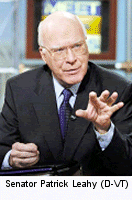Leahy Demands Straight Answers From Gonzales On Tuesday
 Senator Patrick Leahy (D-VT), weary of fighting to get honest answers out of Attorney General Alberto Gonzales in the political firings of eight federal prosecutors, took the unexpected step last week of sending Gonzales a list of the questions he should expect when he appears before the Senate Judiciary Committee on Tuesday.
Senator Patrick Leahy (D-VT), weary of fighting to get honest answers out of Attorney General Alberto Gonzales in the political firings of eight federal prosecutors, took the unexpected step last week of sending Gonzales a list of the questions he should expect when he appears before the Senate Judiciary Committee on Tuesday.Leahy, the committee's Chairman, sent a letter to Gonzales on July 17 pointing out the number of times the embattled Attorney General said he could "not recall" in response to previous direct questioning on his department's operations and saying that he "would like to avoid a repeat of that performance."
"When you last testified before the Senate Judiciary Committee on April 19, 2007, you often responded to questions from Senators on both sides of the aisle that you could 'not recall,'" wrote Leahy in his letter to Gonzales. "By some counts, you failed to answer more than 100 questions, by other counts more than 70, and the most conservative count had you failing to provide answers well over 60 times. As a result, the Committee’s efforts to conduct oversight were hampered."
So Leahy sent questions in advance hoping to give Gonzales a week to think about some better responses to the questions surrounding the U.S. Attorney firings, National Security Letter abuses and the White House's warrantless domestic spying program.
According to Leahy's office, the Judiciary Chairman "put the Attorney General on notice that the Committee would expect answers on inconsistencies in the Attorney General’s public statements and testimony involving the firing of several U.S. Attorneys as well as the President’s warrantless wiretapping program" including the following:
You can also expect some tough questioning from Russ Feingold (D-WI) who has long been in Gonzales's face about the illegal domestic spying program and was a leader in trying to secure a no-confidence vote on the Attorney General last month.
- "On April 19, you testified to the Senate Judiciary Committee that you had not spoken with anyone involved in the firings about that process because you did not want to interfere with the investigation. Again, on May 10, you testified to the House Judiciary Committee that you had not spoken with anyone involved in order to protect the integrity of the investigation. Then on May 23, Monica Goodling testified under oath before the House Judiciary Committee that she had an 'uncomfortable' conversation with you during which you outlined your recollection of what happened and asked her for her reaction to your version. Is Ms. Goodling’s testimony accurate, and if so, how do you account for your previous, uncorrected testimony to this Committee?"
- "On April 19 you testified before this Committee that your former Chief of Staff Kyle Sampson was responsible for putting together the list of U.S. Attorneys to be fired. But on May 15, the day after Deputy Attorney General Paul McNulty announced his intention to resign, you said that the firings were largely Mr. McNulty’s responsibility. Mr. McNulty has said that he had very limited involvement in the decision of which U.S. Attorneys to fire. Please describe all of your interactions with Mr. McNulty related to the replacement of the nine U.S. Attorneys and your understanding of his role in deciding which U.S. Attorneys would be fired. Why has your description of who made the decisions, and who was most involved in the decision-making process, changed over time?"
- "When you were asked on February 6, 2006 if any senior Justice Department officials, including your former deputy, James Comey, expressed concerns about the Bush Administration’s warrantless electronic surveillance program, you testified: 'I do not believe that these DOJ officials . . . had concerns about this program.' Mr. Comey subsequently testified on May 15, 2007 that on March 9, 2004, he informed you, as White House counsel, and others including the Vice President, that the Justice Department had concluded that the Administration’s warrantless electronic surveillance program did not have a legal basis. He testified that you and former White House Chief of Staff Andrew Card tried to circumvent him, in his role as Acting Attorney General, by rushing to the hospital bedside of ailing former Attorney General John Ashcroft to try to persuade him to certify the program. Please provide a full explanation for the legal authorization for the President’s warrantless electronic surveillance program in March and April 2004."
"I voted against Alberto Gonzales to be the Attorney General because I was not convinced he would put the rule of law, and the interests of the country, above those of the President and the Administration," said Feingold in June. "Unfortunately, those concerns have been realized over and over. He has failed in a very significant way. He should resign."
We'll see if the hearings on Tuesday move us closer to that point.

















<< Home